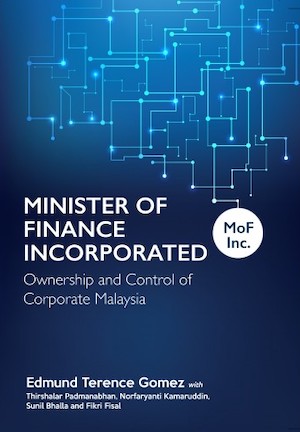An end-of-year series as the Lowy Institute staff and Interpreter contributors offer their favourite books, articles, films or TV programs this year. Watch for more recommendations and reflections in the days ahead.
There are few occasions in life when my “2020 books read” spreadsheet genuinely comes in handy. Fortunately, this is one of them. Clocking one of the fastest pages-per-day speeds on my list, Edmund Terence Gomez’s collaborative work Minister of Finance Incorporated: Ownership and Control of Corporate Malaysia is forensic, revealing and insightful in equal measure.
 China is likely the first country that springs to mind when hearing the words “state-owned enterprise”. But governments play significant roles in many Southeast Asian economies too, with Malaysia’s infamous 1MDB scandal showing how such involvement can go awry. Launching off the 1MDB story, MoF Inc pulls back the curtain on Malaysia’s government-linked investment companies (GLICs) more broadly. The book delves into what they are (vehicles for the government to invest in companies), how they’ve been used across various political regimes (to drive development and to bail out failing private companies) and the control they have over Malaysia’s corporate sector.
China is likely the first country that springs to mind when hearing the words “state-owned enterprise”. But governments play significant roles in many Southeast Asian economies too, with Malaysia’s infamous 1MDB scandal showing how such involvement can go awry. Launching off the 1MDB story, MoF Inc pulls back the curtain on Malaysia’s government-linked investment companies (GLICs) more broadly. The book delves into what they are (vehicles for the government to invest in companies), how they’ve been used across various political regimes (to drive development and to bail out failing private companies) and the control they have over Malaysia’s corporate sector.
Gory details of the government-linked investment companies’ inner workings are mapped alongside Malaysia’s political and economic policy history, preserving a sense of narrative to complement the minutiae.
The sheer breadth and depth of influence the GLICs hold is in itself mind-boggling. 68,000 companies in Malaysia are connected to 35 government-linked companies – which are in turn owned by seven GLICs. At the top of this pyramid sits the Minister of Finance, who controls the most influential GLIC of them all (the Minister of Finance Incorporated). The government consequently holds significant sway in the banking, media, plantations and property development sectors, to name a few, going far beyond the state simply providing public goods.
Just as formidable is the level of detail the book brings to bear on the GLICs in question. It meticulously tracks levels of GLIC equity ownership in hundreds of firms, as well as the political and professional backgrounds of key directors and corporate professionals, among other variables. The result is a rich and informed snapshot of the system in its current and past forms.
Thankfully, the gory details of the GLICs’ inner workings are mapped alongside Malaysia’s political and economic policy history, preserving a sense of narrative to complement the minutiae. Doing so utilises the GLICs as a point of comparison for the different economic policy paths preferred by various prime ministers over time.
MoF Inc brings rigorous research to the ecosystem in which the 1MDB scandal broke out. Crucially, it effectively straddles the importance of individuals as well as structures and systems across Malaysia’s history. In the process, it also reiterates the importance of the country’s economic and political past to understanding the present. Pulling all of this off is no small feat, and ultimately makes for a great read to meaningfully comprehend Malaysia’s political economy.

